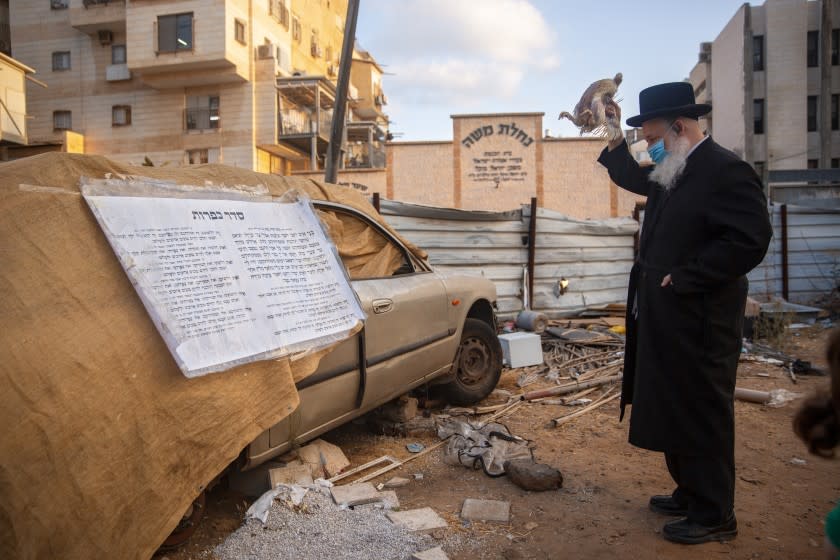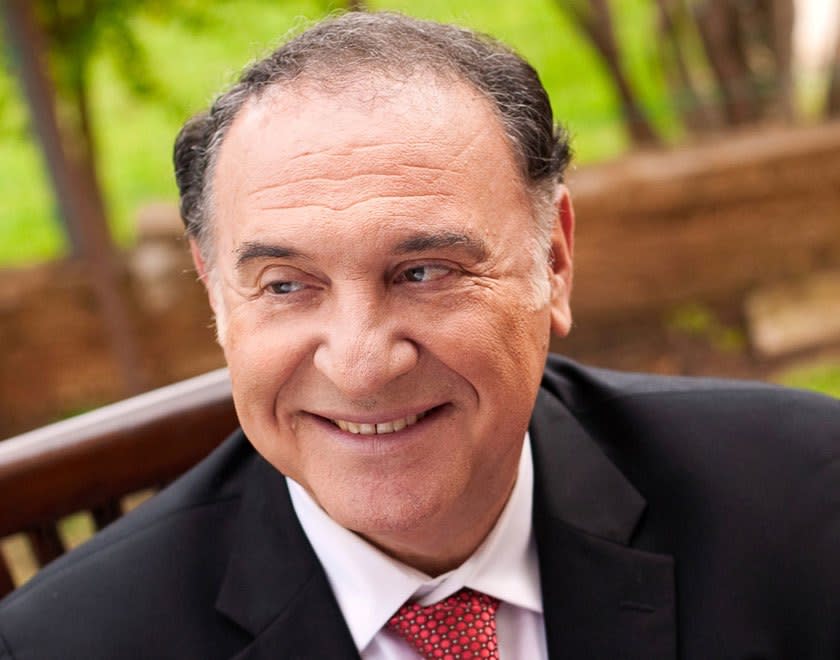In Israel, the Jewish High Holidays clash with a new coronavirus lockdown

Naftali Herstik still remembers the first time he “stood beside the pillar,” meaning that he led Rosh Hashanah services from the central synagogue lectern at which a cantor chants the liturgy.
It was 69 years ago, and he was 4½ years old. The heir of a long dynasty of cantors and rabbis, Herstik was already a famed child prodigy and had accompanied his father at previous celebrations.
He has observed Rosh Hashanah, the Jewish new year, from the well of a temple ever since — until last week. Jerusalem’s Great Synagogue, where Herstik served as chief cantor from its founding in 1981 to 2009, has been closed for the first time in its history because of the COVID-19 pandemic.
For many Jews worldwide, nothing is as sacred as the prayers of the Jewish High Holidays, which are intended to be sung, lustily, in a communal space. Their lack this year has left Herstik distraught.
“It is difficult to describe the depth of sorrow seeing this synagogue closed on Rosh Hashanah,” said Herstik, who immigrated to Israel from Hungary as a child.
The coronavirus has forced adjustments to, and sometimes outright cancellations of, religious rituals across the globe. Many Christians and Jews found their respective Easter and Passover celebrations curtailed, while for Muslims, Ramadan observances and the annual hajj to Mecca were drastically scaled back.
Here in Israel, the holiest period on the Jewish calendar — which culminates Monday with Yom Kippur, the Day of Atonement — is coinciding with the first reimposition of a national coronavirus lockdown anywhere in the world. After initially earning praise for its handling of the pandemic, the Israeli government is now under fire for mismanagement that allowed a second wave of infections to sweep the country.
The government has been paralyzed for months as public health officials warned of a looming disaster while Prime Minister Benjamin Netanyahu’s ultra-Orthodox coalition partners threatened to walk out on their power-sharing deal if synagogues were not allowed to remain open.
On Friday, Israeli lawmakers continued tussling over the details of a bill that would shutter all nonessential businesses and ban employees from going to their workplaces but that could allow synagogues to host up to 20 worshipers praying indoors.
Dr. Hagai Levine, chairman of the Israeli Assn. of Public Health Physicians, a professor of epidemiology at Hebrew University and an advisor to the government, criticized the proposed policy as “the opposite of what we should do.”
“Keeping synagogues open on Yom Kippur sends the wrong message,” Levine said. Permitting gatherings in closed spaces — “the main way people get infected,” he said — will make an already-grim situation “much worse.”
The tug-of-war over the right thing to do has even pitted brother against brother.
This week saw a public disagreement between Chief Sephardic Rabbi Yitzhak Yosef and his younger brother, David Yosef, who is chief rabbi of Har Nof, an ultra-Orthodox neighborhood in Jerusalem.
Yitzhak Yosef issued guidelines instructing his flock to keep synagogues open while reducing the number of worshipers and dividing them into pods. Women, he said, should pray at home if these measures leave insufficient space for them in the synagogue, as men take precedence.
On the other side, David Yosef posted an impassioned video beseeching the ultra-Orthodox community — which has been the hardest hit by the coronavirus — to immediately close all synagogues. Even on Yom Kippur, he said, prayer should take place only outdoors or inside private homes.
“This has happened in previous generations,” he said. “When there were plagues, the sages of Israel did this, too. Save your own lives!”
His plea was unnecessary for some worshipers already spooked by the elevated rates of contagion. Nick Kaufman, a lawyer, went to his local temple to pray on the morning of Rosh Hashanah—and quickly bolted.
“It was scary. No masks. Everyone shouting their prayers … saliva flying everywhere,” he recalled.
“If it’s like that here,” Kaufman said of his secular south Jerusalem neighborhood, “then we are doomed.”
Some Israelis have complained that their right to worship is being restricted at the same time that tens of thousands of their compatriots continue to take to the streets in weekly antigovernment protests. Demonstrators are calling for Netanyahu’s resignation over his ongoing trial on three corruption charges, his handling of the coronavirus crisis and the Israeli economy’s nosedive.
Netanyahu, Israel’s longest-serving prime minister, has denounced the protesters and attempted to ban demonstrations by emergency decree. In a speech in parliament Thursday night, he labeled them “incubators of disease,” although both Levine of the physicians association and Ronni Gamzu, Israel’s coronavirus-response coordinator, say there has been no evidence of COVID-19 infections resulting from the protests.
Amid what is supposed to be a festive and contemplative holiday season, Herstik has simply stopped listening to the news. “Nothing they say matters,” he said. More important is the upcoming ritual of Yom Kippur, which he described as “incomparable to every other thing.”
Herstik, 73, finds himself in a particularly difficult predicament. His age places him in a high-risk group. Israel remains the country with highest rate of new confirmed COVID-19 cases per capita, and Jerusalem, where Herstik lives, is its worst-afflicted city.

Further complicating matters, he is the recipient of a transplanted kidney and, because it is failing, undergoes dialysis every other day while he waits for a replacement. In a vulnerable population, he is the most vulnerable.
“My heart is with Rav Yosef the older,” Herstik said of the chief rabbi who wants synagogues to remain open. “But my head is with David Yosef,” the younger brother.
The closure of the Great Synagogue has affected not just Herstik — who has continued to help lead liturgies there despite his formal retirement — but others like Motti Friedman, who has traveled as far as Moscow just to hear Herstik’s singing.
“The synagogue atmosphere focuses a person. The prayer flows more naturally,” said Friedman, the former director of the Zionist Archives. “But for me, personally, a great cantor creates the transcendent connection that is beyond cognition. Naftali is one of them.”
Herstik and his wife, Elka, spent the first night of the holiday period at home by themselves in a dejected mood, away from their five adult children and almost 20 grandchildren.
He is now girding for a similarly lonely Yom Kippur, consoled only by the knowledge that the measures keeping him from communal worship are also saving his life.
“Every effort must be made to pray on Yom Kippur,” he said, citing the example of Jewish POWs during World War II who went to great lengths to observe the holiday. “But anyone who doesn’t keep to the restrictions is a social criminal.”
Tarnopolsky is a special correspondent.
This story originally appeared in Los Angeles Times.

